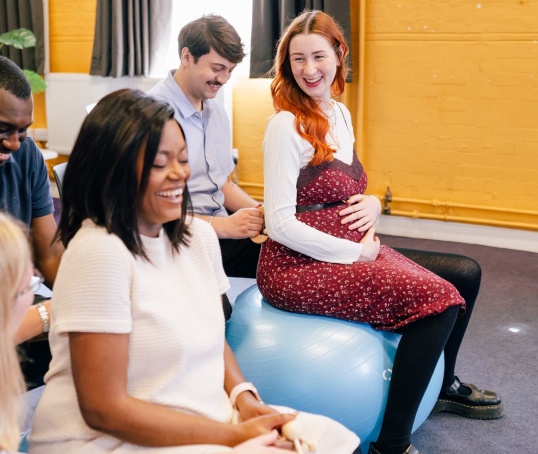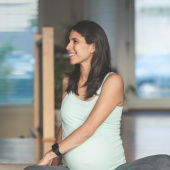It’s common to feel very tired during pregnancy (NHS, 2024a), and it can be a time when it’s hardest to get to sleep or stay asleep. Read about some causes of disrupted sleep and tips on how to sleep better during pregnancy.
During the first three months of pregnancy, hormonal changes often mean the woman or pregnant person feels tired, nauseous and emotional. Towards the end of the pregnancy, the extra weight can feel exhausting (NHS, 2024a).
While disturbed sleep on its own won’t be harmful, it is frustrating and draining. It’s useful to remember that what the body needs is rest, and within each 24 hour period this doesn’t all have to be sleep. So, finding ways to rest will help (NHS, 2024a).
Some common pregnancy discomforts, including needing to use the toilet more often, can make it harder to sleep (NHS, 2024a).
The pregnancy-related discomforts that are more likely at night are included in this article.
What is the best position for sleep?
Going to sleep lying on either side of the body, especially after 28 weeks, reduces the chance of stillbirth. This may be because it protects the blood flow and oxygen to the baby (NHS, 2024a).
It doesn’t matter if a pregnant woman or person goes to sleep on their side and wakes up on their back. Just return to the side before going back to sleep (Heazell et al, 2018; NHS, 2024a).
What can help with sleep and rest when pregnant?
Here are some things that might help:.
- Avoid caffeine in stimulants like tea, coffee, or cola in the evening (NHS, 2024a).
- Supporting the bump with pillows, or putting a pillow between the knees, can help to find a more comfortable position (NHS, 2024a).
- Relaxation techniques can improve sleep quality (NHS, 2024a; Özkan & Rathfisch, 2018). You can learn these techniques in our NCT Antenatal classes.
- Gentle exercise during pregnancy is generally safe and can improve sleep (NHS, 2024a).
Even when sleep isn’t possible, accepting help and taking breaks to rest will help overall wellbeing (NHS, 2024a).
Pregnancy-related discomforts that might disrupt sleep
Carpal tunnel
Carpal tunnel syndrome is caused by pressure on a nerve in the wrist. During pregnancy it is often worse at night, but it usually goes away in a few months after the birth (NHS, 2024b).
It is felt as (NHS, 2024b):
- aching or numbness in the fingers, hand or arm
- pins and needles or tingling sensations
- a weak thumb or grip
The discomfort might be eased by (NHS, 2024b):
- taking paracetamol (Ibuprofen is not recommended in pregnancy)
- keeping the wrist straight at night by wearing a splint, which reduces pressure on the nerve
- hand exercises
Mention to a midwife or GP if experiencing this. If nothing helps the symptoms of carpal tunnel syndrome, a GP might suggest a steroid injection to reduce the swelling (NHS, 2024b).
Dreams and nightmares
It’s normal for the pregnant woman or person to have strange dreams about labour and birth, or the baby. Talking about these things with a trusted person can help. You can also try relaxation techniques to reduce anxiety before bed (NHS, 2024a).
Leg cramps
Leg cramps happen when the muscles in the leg contract, usually in the calf. This causes a sudden pain (NHS, 2023).
They are common, particularly in later pregnancy (Luo et al, 2020). Leg cramps can happen at any time but usually happen at night or when resting (NHS, 2023).
What can ease the pain of leg cramps?
Most cramps go away without doing anything. However, stretching or massaging the muscle can help.
If possible, standing up and putting weight on the leg might also ease the cramp (NHS, 2023).
Supplements containing magnesium, calcium, vitamin B, C or D or calcium-vitamin D are commonly promoted to reduce leg cramps. But there is no evidence that they work (Luo et al, 2020).
Paracetamol might help the soreness caused by leg cramps. However, it takes too long to work to relieve the pain of the leg cramp itself (NHS, 2023).
A GP might offer quinine tablets if stretching exercises haven’t helped (NHS, 2023).
Can leg cramps be prevented?
To prevent leg cramps happening, try stretching the calf for a few seconds, relaxing then repeating for 5 minutes. Do this three times a day, including before bed (NHS, 2023).
Dehydration can cause leg cramps, so drinking plenty of fluids during the day may help (NHS, 2023).
Mental health
Not being able to get to sleep when pregnant can sometimes be a sign of depression. Speaking to a doctor or midwife can get the right treatment (NHS, 2024a).
Pelvic girdle pain
When the pelvic bones and ligaments are unbalanced it can cause discomfort in pregnancy. Read our article on pelvic girdle pain (PGP).
Restless legs
Up to 1 in 4 pregnant women and people experience Restless Leg Syndrome (RLS) in pregnancy (RLS-UK, no date a).
When having an episode of RLS, the person feels an uncomfortable or strange sensation in part of their body. It might happen in legs, but also the arms, torso or head. Moving the body part gives short term relief (RLS-UK, no date b).
It can happen at any time but is most common at night. For some people it can be painful (RLS-UK, no date b).
RLS usually gets worse towards the end of pregnancy. Most of the time, it goes away after the baby is born (RLS-UK, no date a).
Am I at risk of RLS?
Pregnant woman and people who suffered from RLS before pregnancy often find it gets worse during pregnancy. However, those taking medication for RLS should stop when they become pregnant and discuss with their doctor (RLS-UK, no date a).
About 2 in every 3 women and pregnant people who experience RLS, do so for the first time during pregnancy. A family history, or having had RLS before, makes it more likely it will be experienced in this pregnancy (RLS-UK, no date a).
Can anything help?
Things that can help reduce the chance of RLS are (RLS-UK, no date a):
- Stretching exercises before bed
- Massage or relaxation exercises
- Hot or cold packs, or a warm bath
- Avoiding smoking or alcohol
And the same techniques, plus distraction, could help reduce symptoms while they are happening (RLS-UK, no date a).
There isn’t enough data to know whether drugs used to treat RLS are safe in pregnancy. So they are not recommended (RLS-UK, no date a).
The GP or midwife can advise on supplements which might reduce the chance of RLS. These include iron, magnesium, vitamin B12, or folate, which may already be included in prenatal supplements (RLS-UK, no date a).
How can I avoid disturbing my partner when it’s hard to sleep?
If the pregnant woman or person has a partner, they may be concerned about disturbing them at night. This might be because the partner has job where it’s important to be alert.
Reduce the chance of disturbance by:
- Using separate covers so they can be thrown off one partner if they get hot, leaving the other partner covered
- Sleeping separately (if possible) to ensure both partners get a good night’s sleep.
Further information
Those experiencing sleep problems before pregnancy might find this NHS article on insomnia helpful.
Heazell AEP, Li M, Budd J, Thompson JMD, Stacey T, Cronin RS, Martin B, Roberts D, Mitchell EA, McCowan LME. (2018) Association between maternal sleep practices and late stillbirth – findings from a stillbirth case-control study. BJOG; 125: 254–262. https://doi.org/10.1111/1471-0528.14967
Luo L, Zhou K, Zhang J, Xu L, Yin W. (2020) Interventions for leg cramps in pregnancy. Cochrane Database of Systematic Reviews, Issue 12. Art. No.: CD010655. https://doi.org/10.1002/14651858.CD010655.pub3
NHS (2023) Leg cramps. https://www.nhs.uk/conditions/leg-cramps/ [17 Mar 25]
NHS (2024a) Tiredness and sleep problems in pregnancy. https://www.nhs.uk/pregnancy/related-conditions/common-symptoms/tiredne… [17 Mar 25]
NHS (2024b) Carpal tunnel syndrome. https://www.nhs.uk/conditions/carpal-tunnel-syndrome/ [14 Mar 25]
Özkan SA, Rathfisch G (2018) The effect of relaxation exercises on sleep quality in pregnant women in the third trimester: A randomized controlled trial, Complementary Therapies in Clinical Practice, 32, pp79-84. https://doi.org/10.1016/j.ctcp.2018.05.008
RLS-UK (no date a) RLS in Pregnancy. https://www.rls-uk.org/rls-in-pregnancy/ [17 Mar 25]
RLS-UK (no date b) What is RLS?. https://www.rls-uk.org/what-is-rls [7 Jul 25]







